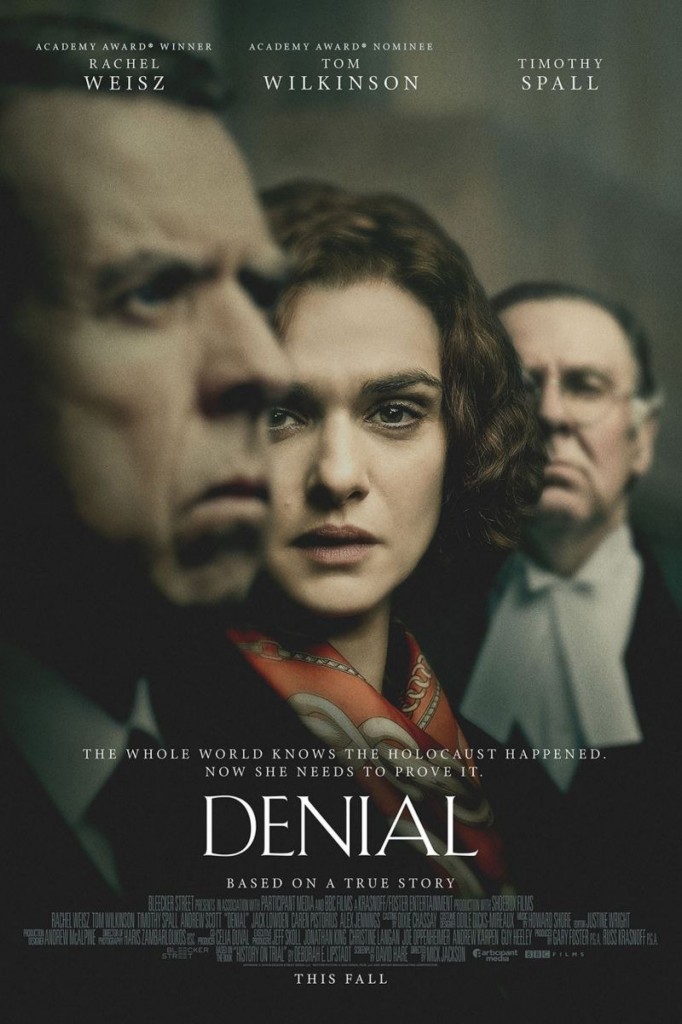by Bonnie Anderson and Dan Webster
In 1996 a British author, David Irving (Timothy Spall), who presented himself as an historian, wrote a book denying the existence of the gas chambers that annihilated millions of Jews. His libel lawsuit, was aimed at an American Jewish author/history professor, and Penguin Publishing, and it played out in a London court. That suit and subsequent court proceedings and judgment is what Hollywood portrays in a “based on a true story” recently released film, ‘Denial.’
The legal battle is fought over the concept of historical truth. Who, actually, has the truth of what happened in an important historical event? According to this film, there were not actual photographs recovered that gave specific evidence of the gas chambers, but Professor Lipstadt named Irving as a “Holocaust denier” in her book. The burden of proof is the responsibility of the accused in the British system and Lipstadt finds herself questioning the strategy of her British attorneys as she emotionally relates to the Holocaust survivors who want to testify on their own behalf have their voices heard.
This film teaches us about the British legal system in fascinating detail. A barrister argues before the court and the solicitor prepares the case. A brilliant performance by Tom Wilkinson as Richard Rampton, the barrister, is worth the price of admission alone. The subtlety with which he argues this case is a nod to the British court system and another nod for understated but effective research and delivery.
The arguments that ensue during the film between Lipstadt and Rampton reveal the tension between the truth and the law. The depth of feelings create tension in a topic as emotionally and historically charged as the Holocaust. This is a trial of truth, but Irving is the one who is really on trial.
As the case is prepared there is a visit to Auschwitz that evokes emotion and heartbreak. In one scene Lipstadt stands over the steps leading to one of the gas chambers as she chants a Hebrew prayer while ghost-like images of people walking down those steps are super-imposed. Lipstadt is resolved that those who suffered will be remembered. She is driven by this as she navigates her emotions amidst the realities of a legal system.
For us, as movie goers and the people of God, we seek the truth. We forget that sometimes. We find ourselves asking what is true in the situation depicted in this film? Pursuit of the truth can be seductive. It can be colored by our desires – what we want to be true. Christians watching this film may be hearing the words of Jesus, “The truth shall set you free.” (John 8:32) But first we have to find the truth so the discernment of the truth is our initial quest to the freedom promised.
This film is a good study in the pursuit of truth through a contemporary judicial system. Particularly now, in our own society we are confronted daily in our quest for discernment of truth. Here we turn to the words of St. Augustine, “The truth is like a lion, you don’t have to defend it. Let it loose, it will defend itself.”
Bonnie Anderson is a very active lay leader in her parish, diocese and in the wider Episcopal Church. She is an experienced community organizer and lives in suburban Detroit. Dan Webster is an Episcopal priest in Baltimore, Maryland and a former broadcast news executive. But don’t expect only east coast urban perspectives here. As it turns out, they both grew up in Southern California. They blog about films and faith at Faith Reels

